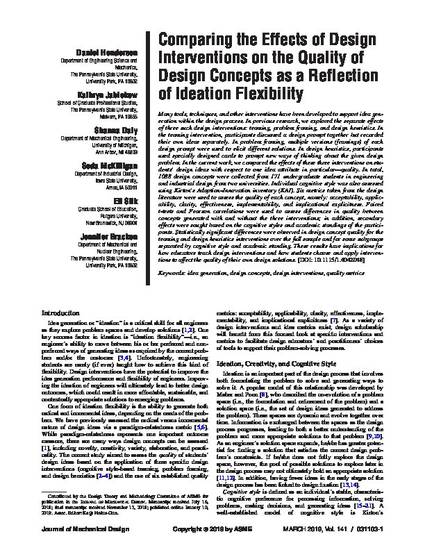
Article
Comparing the effects of design interventions on the quality of design concepts as a reflection of ideation flexibility
Journal of Mechanical Design
(2019)
Abstract
Many tools, techniques, and other interventions have been developed to support idea generation
within the design process. In previous research, we explored the separate effects
of three such design interventions: teaming, problem framing, and design heuristics. In
the teaming intervention, participants discussed a design prompt together but recorded
their own ideas separately. In problem framing, multiple versions (framings) of each
design prompt were used to elicit different solutions. In design heuristics, participants
used specially designed cards to prompt new ways of thinking about the given design
problem. In the current work, we compared the effects of these three interventions on students’
design ideas with respect to one idea attribute in particular—quality. In total,
1088 design concepts were collected from 171 undergraduate students in engineering
and industrial design from two universities. Individual cognitive style was also assessed
using Kirton’s Adaption–Innovation inventory (KAI). Six metrics taken from the design
literature were used to assess the quality of each concept, namely: acceptability, applicability,
clarity, effectiveness, implementability, and implicational explicitness. Paired
t-tests and Pearson correlations were used to assess differences in quality between
concepts generated with and without the three interventions; in addition, secondary
effects were sought based on the cognitive styles and academic standings of the participants.
Statistically significant differences were observed in design concept quality for the
teaming and design heuristics interventions over the full sample and for some subgroups
separated by cognitive style and academic standing. These results have implications for
how educators teach design interventions and how students choose and apply interventions
to affect the quality of their own design solutions.
Keywords
- idea generation,
- design concepts,
- design interventions,
- quality metrics
Disciplines
Publication Date
Winter February 1, 2019
DOI
10.1115/1.4042048
Citation Information
Daniel J. Henderson, Kathryn Jablokow, Seda McKilligan, Shanna Daly, et al.. "Comparing the effects of design interventions on the quality of design concepts as a reflection of ideation flexibility" Journal of Mechanical Design Vol. 141 Iss. 031103-1-11 (2019) Available at: http://works.bepress.com/seda-yilmaz/46/
